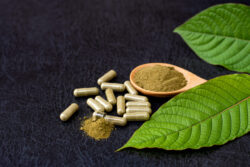What is Kratom and Is it Legal?

Men and women alike seek out herbal substances regularly to help with all kinds of symptoms – ashwagandha to alleviate stress, green tea to help clear the skin, etc; but what about substances that are more drug-like than herbal tea? What about kratom, a substance that, while it has been historically brewed in tea, might do more harm to the body than good?
What is kratom?
According to the National Institute on Drug Abuse, “‘Kratom’ refers to both Mitragyna speciosa, a tree native to Southeast Asia, and to products derived from its leaves that are marketed as herbal supplements. Kratom leaves contain many chemical compounds (known as bioactive alkaloids) that can affect the body.… Much is still unknown about chemical compounds related to kratom, the short- and long-term health and safety impacts of kratom use, and kratom’s potential therapeutic uses.”
Kratom has been used in Southeast Asia for hundreds of years, primarily by the local farmers who claim its properties help increase productivity and energy while they work or alleviate tension during social situations.
But even though it has been used for centuries, little research exists on the actual legitimate medical properties of kratom. Most of the discoveries in regards to this drug exist on an anecdotal level, leaving room for concern in regards to safety and effectiveness as far as how much the medical benefits (if any) outweigh the side effects.
What are the effects of kratom?
There are two chemical compounds in kratom – mitragynine and 7-hydroxy mitragynine – which have the strongest effect on the body. Both alkaloids “act as partial agonists on the opioid receptors, meaning they produce somewhat similar, but milder, effects to opioid-based medications. This is partly due to the low concentrations of psychoactive compounds within the plant matter (usually 1 – 1.5 percent), meaning relatively large amounts of kratom need to be consumed before a noticeable psychoactive effect occurs.
“Bodily effects may be noticeable at slightly lower doses; some users report the principal (or only) effect as an absence of fatigue or pain. Interestingly, mitragynine also has a broad affinity with many other receptors in the body, potentially explaining its complex effect on energy and mood.”
Kratom is often used as a method of self-medication to help with withdrawal from opioids, including heroin and morphine, as well as help alleviate symptoms from certain mental health conditions, including anxiety and depression. Again, this is heavily based on personal exploration, and no authority within the US has marked kratom as a viable medical substance.
Is kratom legal?
According to the Department of Justice/Drug Enforcement Administration, “Kratom is not controlled under the Controlled Substances Act; however, there may be some state
regulations or prohibitions against the possession and use of kratom. The FDA has not approved Kratom for any medical use. In addition, DEA has listed kratom as a Drug and Chemical of Concern.”
Various countries have banned or restricted kratom, but in the United States, it remains legal to buy and sell kratom in most places. However, this is all done at the risk of the individual and would never be recommended by a medical professional as no medical use of kratom has currently been established.
In the state of West Virginia in particular, kratom was declared legal in June 2023. While still under certain regulations, it nevertheless became accessible to residents who were seeking out its effects.
Is kratom addictive?
But this brings us to the question – is kratom addictive? It is most often pursued as a means of helping to withdraw from more severely addictive drugs, but can it become addictive in and of itself as a result?
“Some experts are concerned about kratom’s addictive potential because the main kratom compounds, mitragynine, and 7-hydroxy mitragynine, partially activate the same receptors (specific molecular structures on the surface of nerve cells) in the brain on which drugs with known addictive properties act. However, researchers have observed that the way kratom compounds activate these receptors may reduce the potential for addiction relative to opioids.”
Over time, evidence has revealed that those who use routine kratom may experience mild withdrawal symptoms if they attempt to stop taking kratom or do not ingest it daily.
Regardless of whether or not kratom is taken daily, it is always best practice to consult with your medical doctor if you are considering taking kratom regularly, have struggled with substance abuse in the past, or have found yourself experiencing symptoms of addiction in regards to kratom.
Help for substance misuse and addiction
If you or a loved one are struggling with using substances, Pyramid Healthcare is here to help. To contact a mental healthcare specialist to complete a mental health assessment to determine your needed level of care, contact Pyramid Healthcare by calling 888-461-7426 to learn more.
Additionally, if you are a West Virginia resident, consider contacting any of our WV facilities to talk more about our program offerings in your local area.
Men and women alike seek out herbal substances regularly to help with all kinds of symptoms – ashwagandha to alleviate stress, green tea to help clear the skin, etc; but what about substances that are more drug-like than herbal tea? What about kratom, a substance that, while it has been historically brewed in tea, might do more harm to the body than good?
What is kratom?
According to the National Institute on Drug Abuse, “‘Kratom’ refers to both Mitragyna speciosa, a tree native to Southeast Asia, and to products derived from its leaves that are marketed as herbal supplements. Kratom leaves contain many chemical compounds (known as bioactive alkaloids) that can affect the body.… Much is still unknown about chemical compounds related to kratom, the short- and long-term health and safety impacts of kratom use, and kratom’s potential therapeutic uses.”
Kratom has been used in Southeast Asia for hundreds of years, primarily by the local farmers who claim its properties help increase productivity and energy while they work or alleviate tension during social situations.
But even though it has been used for centuries, little research exists on the actual legitimate medical properties of kratom. Most of the discoveries in regards to this drug exist on an anecdotal level, leaving room for concern in regards to safety and effectiveness as far as how much the medical benefits (if any) outweigh the side effects.
What are the effects of kratom?
There are two chemical compounds in kratom – mitragynine and 7-hydroxy mitragynine – which have the strongest effect on the body. Both alkaloids “act as partial agonists on the opioid receptors, meaning they produce somewhat similar, but milder, effects to opioid-based medications. This is partly due to the low concentrations of psychoactive compounds within the plant matter (usually 1 – 1.5 percent), meaning relatively large amounts of kratom need to be consumed before a noticeable psychoactive effect occurs.
“Bodily effects may be noticeable at slightly lower doses; some users report the principal (or only) effect as an absence of fatigue or pain. Interestingly, mitragynine also has a broad affinity with many other receptors in the body, potentially explaining its complex effect on energy and mood.”
Kratom is often used as a method of self-medication to help with withdrawal from opioids, including heroin and morphine, as well as help alleviate symptoms from certain mental health conditions, including anxiety and depression. Again, this is heavily based on personal exploration, and no authority within the US has marked kratom as a viable medical substance.
Is kratom legal?
According to the Department of Justice/Drug Enforcement Administration, “Kratom is not controlled under the Controlled Substances Act; however, there may be some state
regulations or prohibitions against the possession and use of kratom. The FDA has not approved Kratom for any medical use. In addition, DEA has listed kratom as a Drug and Chemical of Concern.”
Various countries have banned or restricted kratom, but in the United States, it remains legal to buy and sell kratom in most places. However, this is all done at the risk of the individual and would never be recommended by a medical professional as no medical use of kratom has currently been established.
In the state of West Virginia in particular, kratom was declared legal in June 2023. While still under certain regulations, it nevertheless became accessible to residents who were seeking out its effects.
Is kratom addictive?
But this brings us to the question – is kratom addictive? It is most often pursued as a means of helping to withdraw from more severely addictive drugs, but can it become addictive in and of itself as a result?
“Some experts are concerned about kratom’s addictive potential because the main kratom compounds, mitragynine, and 7-hydroxy mitragynine, partially activate the same receptors (specific molecular structures on the surface of nerve cells) in the brain on which drugs with known addictive properties act. However, researchers have observed that the way kratom compounds activate these receptors may reduce the potential for addiction relative to opioids.”
Over time, evidence has revealed that those who use routine kratom may experience mild withdrawal symptoms if they attempt to stop taking kratom or do not ingest it daily.
Regardless of whether or not kratom is taken daily, it is always best practice to consult with your medical doctor if you are considering taking kratom regularly, have struggled with substance abuse in the past, or have found yourself experiencing symptoms of addiction in regards to kratom.
Help for substance misuse and addiction
If you or a loved one are struggling with using substances, Pyramid Healthcare is here to help. To contact a mental healthcare specialist to complete a mental health assessment to determine your needed level of care, contact Pyramid Healthcare by calling 888-461-7426 to learn more.
Additionally, if you are a West Virginia resident, consider contacting any of our WV facilities to talk more about our program offerings in your local area.








